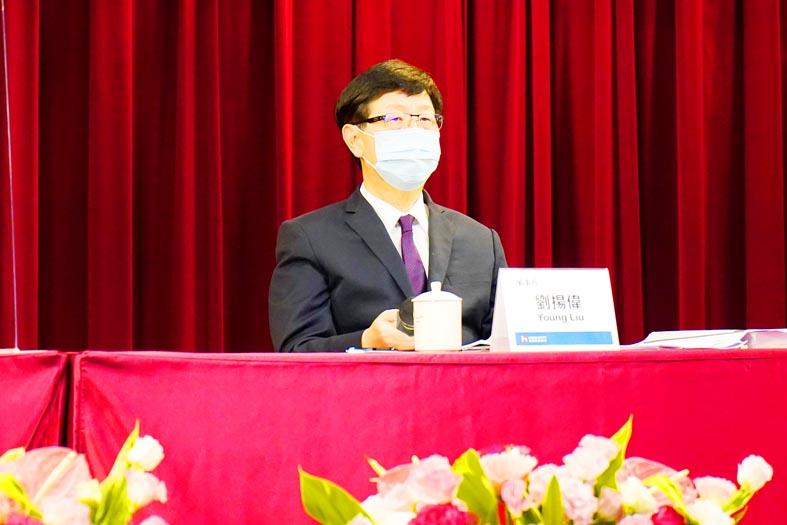Hon Hai Precision Industry Co’s (鴻海精密) sales for this quarter might be flat from the second quarter, it said yesterday after reporting better-than-expected profit for last quarter.
At an investors’ conference in Taipei, chairman Young Liu (劉揚偉) projected revenue for the company, known globally as Foxconn Technology Group (富士康科技集團), would be flat sequentially this quarter, but would increase by 3 to 15 percent year-on-year, amid a possible resurgence of COVID-19 in Asia and uncertainty over the Delta variant of SARS-CoV-2.
“The components shortage will not get better for the second half of the year, but Hon Hai is insulated because we focus on our major customers,” Liu said. “What’s more important to watch for is the impact on the global ICT [information and communications technology] supply chain if the COVID-19 situation deteriorates in Asia.”

Photo courtesy of Hon Hai Precision Industry Co via CNA
Sales at the company’s consumer electronics business, which includes Apple Inc’s iPhone, are projected to decline this quarter compared with the previous three months, Hon Hai said.
Liu said that high comparison numbers in the previous quarter, as well as product transitioning, would result in a slight sequential sales decline in the consumer electronics unit, but total revenue would be little changed sequentially.
The company reported net profit of NT$29.8 billion (US$1.07 billion) in the second quarter, up 6 percent quarter-on-quarter and 30 percent year-on-year. Earnings per share were NT$2.15, up from NT$1.65 a year earlier. Consolidated revenue was NT$1.35 trillion last quarter, up 0.3 percent quarterly and 20 percent annually.
To ensure sufficient supplies, Hon Hai has struck various semiconductor pacts.
It last week announced that it would acquire a mature 6-inch wafer plant from Macronix International Co (旺宏). In May, the company said it was to set up a joint chip venture with Yageo Corp (國巨).
Hon Hai is also targeting electric vehicles (EV) to diversify its business beyond making products for Apple, which accounts for about 50 percent of its revenue.
Although only a small part of the company’s revenue, automotive component sales are to break NT$10 billion this year, representing 40 percent year-on-year growth, Liu said.
“We anticipate more announcements of joint projects in the second half of 2021 in the electric vehicle space,” Liu said. “The revenue growth is going to be even greater in 2022.”
Hon Hai plans to roll out its first electric bus next year, he said, adding that the first Hon Hai electric sedan is to begin production in 2023.
“We predict EV to reach a market penetration of 20 percent, meaning an addressable market in the range of US$600 billion,” Liu said. “With our current EV strategy, we think we can capture five percent of that market share.”
Globally, Hon Hai said it plans to establish EV plants in Thailand and the US.
The US plant would produce 150,000 vehicles per year in 2023, ramping up to 300,000 to 500,000 vehicles per year, it said.
There are “several thousand” Hon Hai employees just working in the EV division, the company said.

SEEKING CLARITY: Washington should not adopt measures that create uncertainties for ‘existing semiconductor investments,’ TSMC said referring to its US$165 billion in the US Taiwan Semiconductor Manufacturing Co (TSMC, 台積電) told the US that any future tariffs on Taiwanese semiconductors could reduce demand for chips and derail its pledge to increase its investment in Arizona. “New import restrictions could jeopardize current US leadership in the competitive technology industry and create uncertainties for many committed semiconductor capital projects in the US, including TSMC Arizona’s significant investment plan in Phoenix,” the chipmaker wrote in a letter to the US Department of Commerce. TSMC issued the warning in response to a solicitation for comments by the department on a possible tariff on semiconductor imports by US President Donald Trump’s

The government has launched a three-pronged strategy to attract local and international talent, aiming to position Taiwan as a new global hub following Nvidia Corp’s announcement that it has chosen Taipei as the site of its Taiwan headquarters. Nvidia cofounder and CEO Jensen Huang (黃仁勳) on Monday last week announced during his keynote speech at the Computex trade show in Taipei that the Nvidia Constellation, the company’s planned Taiwan headquarters, would be located in the Beitou-Shilin Technology Park (北投士林科技園區) in Taipei. Huang’s decision to establish a base in Taiwan is “primarily due to Taiwan’s talent pool and its strength in the semiconductor

Industrial production expanded 22.31 percent annually last month to 107.51, as increases in demand for high-performance computing (HPC) and artificial intelligence (AI) applications drove demand for locally-made chips and components. The manufacturing production index climbed 23.68 percent year-on-year to 108.37, marking the 14th consecutive month of increase, the Ministry of Economic Affairs said. In the first four months of this year, industrial and manufacturing production indices expanded 14.31 percent and 15.22 percent year-on-year, ministry data showed. The growth momentum is to extend into this month, with the manufacturing production index expected to rise between 11 percent and 15.1 percent annually, Department of Statistics

An earnings report from semiconductor giant and artificial intelligence (AI) bellwether Nvidia Corp takes center stage for Wall Street this week, as stocks hit a speed bump of worries over US federal deficits driving up Treasury yields. US equities pulled back last week after a torrid rally, as investors turned their attention to tax and spending legislation poised to swell the US government’s US$36 trillion in debt. Long-dated US Treasury yields rose amid the fiscal worries, with the 30-year yield topping 5 percent and hitting its highest level since late 2023. Stocks were dealt another blow on Friday when US President Donald